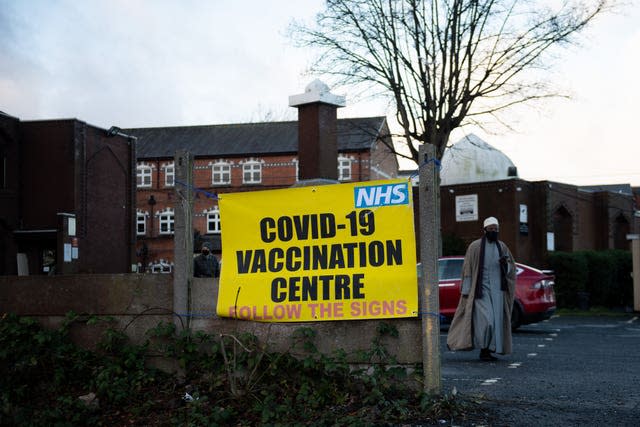Ethnic minority multigenerational household groups ‘should get jab at same time’
Members of ethnic minority multigenerational households should be vaccinated at the same time to ensure they have the maximum protection from coronavirus, a charity has said.
The Government is being urged to prioritise vaccinating ethnic minority groups after research showed that people of South Asian background have continued to experience disproportionately high Covid-19 death rates.
The Runnymede Trust said it is amplifying its call and the Government should particularly focus on Bangladeshi and Pakistani communities who live in densely populated urban areas.
Many British Bangladeshis and Pakistanis feel they are being “utterly failed by the system”, said chief executive Dr Halima Begum, who is of Bangladeshi heritage.
Her father, who is in his 90s and is shielding as he awaits a major cancer operation, was asked to travel five miles across London to get his vaccine despite living fewer than 200 metres from his GP surgery.
Dr Begum and her younger brother took the day off work so they could get him there safely.
She said mobile vaccination hubs should be made available across the country to avoid access issues and these should offer the vaccine to all members of a multigenerational household at once.
If elderly members of these households have already been vaccinated, the rest of the family should be offered the vaccine as soon as possible.
A review by Public Health England found that overcrowding can contribute to the spread of Covid-19 and is more prevalent in black, Asian and minority ethnic (BAME) households.
Dr Begum told the PA news agency: “BAME people, who are fully aware of how to safeguard themselves and fully understand the importance of vaccination, are still dying disproportionately because of factors over which they have limited control.
“But the Government still shows no inclination to implement an ethnicity-based risk assessment as regards prioritised access to the vaccine.”

Dr Begum said her elder brother, an Uber driver who is immunosuppressant, contracted Covid-19 for a second time in January and had to spend two weeks in hospital in January for help with his breathing.
His wife also needed treatment and, while there, they recognised Bangladeshi people they knew on their wards, several of whom died.
She said: “Imagine being in hospital and seeing other people you know – that’s the level of contagion in our communities.
“He’s now scarred by that.”
Research published earlier this week showed that Bangladeshi and Pakistani people have experienced an “alarming” higher risk of dying with coronavirus throughout both waves of the pandemic, compared to British white people.
The authors said people from South Asian groups are more likely to live in deprived areas and in large, multigenerational households.
A higher proportion of Pakistani and Bangladeshi men work as taxi drivers, shopkeepers and proprietors than any other ethnic background – occupations with a higher risk of exposure to coronavirus.
Dr Begum said the Government’s response must be “far more tailored” and reflect the fact that this is an “emergency situation”.
She continued: “We know, for instance, that in terms of improving public health and access to health care, mobile smear testing and mammogram clinics proved highly successful before the pandemic.
“It should not be beyond the realms of possibility to get mobile vaccination units out to reach the elderly and those with underlying health conditions from south Asian communities living in our inner cities.”
She added that the Government should consider making higher grade protective masks available for frontline workers to better protect them against new strains.
At the end of January the NHS Race and Health Observatory asked the Joint Committee on Vaccination and Immunisation (JCVI) how its call for flexibility in the vaccine rollout to combat inequalities is being followed and monitored.
Different ethnic groups are not specifically mentioned in the priority list but the JCVI said there should be local “flexibility”, with attention to “mitigating health inequalities, such as might occur in relation to access to healthcare and ethnicity”.
The observatory has not yet received a response and said much more needs to be done to reach these communities, including more tailored communications and using more bilingual local authority, health and social care staff.
Director Habib Naqvi said: “The most at-risk, the vulnerable and health care staff are currently being invited to receive their vaccine, in line with JCVI guidance.
“Given the overall high death rate and vulnerability of some ethnic minority communities, prioritising these communities for the next cohort of vaccine uptake, should be considered with urgency.”

The 1928 Institute, which published research in January suggesting just over half of British Indians would get a jab, said hesitancy appears to be decreasing as a result of increased media attention and improved messaging.
Co-founders Dr Nikita Ved and Kiran Kaur Manku, from Oxford University, said: “Enabling ‘flexibility’ at a local level, as per the JCVI’s recommendation, is critical to addressing the pandemic and wider health inequalities, for example turning places of worship into vaccination centres which would allow people to be vaccinated in a safe and trusted environment.”
They added that more needs to be done to address the “deeper health inequalities as historically experienced” by ethnic minority groups.
Vaccine hesitancy could be further addressed if the Government provided information on how it is supporting vaccine distribution in low and middle income countries, cited as a reason for reluctance in its research.


